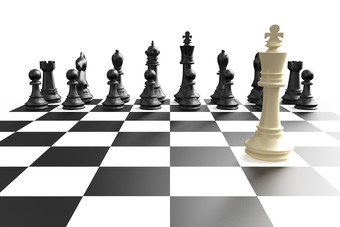 What it feels like to play chess with Pops. (Image taken from WSJ.) What it feels like to play chess with Pops. (Image taken from WSJ.) One of my fellow teachers is currently running a chess tournament at our school. My planning period coincides with all three lunches, and I don't share a classroom. So when there aren't actual classes going on, my room fills up with teenagers conducting very intense chess matches, even if they are no longer in the tournament. Most of the time, watching kids learn to play chess is a delight. I am not particularly good at chess myself, but I smile every time I spot someone who has checked out a chess strategy book from the library or who is trying to watch YouTube chess tips on a cell phone. (Hey, it's better than Snapchat!) But while chess may be all games, it's not always all fun. Several of my lunchtime players are new to the game, which means they get crushed by more experienced opponents. Last week, one of the novices was frustrated after a relative veteran gleefully destroyed him, to the point where he needed to step out for a bit. When he returned, one of the other experienced players made a huge mistake: He challenged the newbie to a match for fun, and then let him win. When called on it, he said, "Well I didn't think you'd be able to tell!" Ouch. It's a topic we all have opinions about: Should you ever "let" someone else win a game? If so, under what circumstances? There was a spate of news stories around Christmas 2015 that encouraged parents not to let their kids win at board games. And in an era where every kid who plays a team sport gets a participation trophy, it does seem like our society is in need of more healthy competition. It's interesting to work through this issue with chess, because it stirs up memories from my own childhood. When I was still in elementary school, I spent a summer with my grandparents and played chess with my grandfather every single night. He had no mercy. I felt so much despair during that month because Pops would just decimate me and I could never quite figure out why. (He's not much of a talker.) I still get anxious about playing chess because it takes me back to night after night of crushing losses with no discernible evidence of progress. I only beat Pops one time, on the second to last night. I'm pretty sure I just got lucky, but victory was sweet. I'm glad he never let me win. Still, since that summer, I have barely played any chess at all, and just thinking about it gets me all worked up. Perhaps the best solution is the middle way: Play to win, but not to destroy. Letting someone win devalues the game and shows disrespect for your opponent. But when playing a friendly game, especially one that includes new players, keep it friendly. There is no need for ultra-competitive craziness. Try a new mechanic. Conduct a bold experiment. Test the limits of the game. You can't always do that stuff when you're out for blood, so take the chance while you're supposed to just be having fun. Also, play in a way that keeps everyone in the game for as long as possible. (There are obvious exceptions to this, depending on the game you're playing.) No one, even someone who is just learning a game, wants to feel like they have no chance at all. I have always hated to lose, and I probably always will. But these days, I derive most of my enjoyment from feeling that I have put up a good fight and played well. Winning is fun, but progress is satisfying. I might still enjoy chess if I had gotten a better understanding of what I could do to improve, even after so many losses. Of course, if you are a highly competitive person who wants to see the enemy driven before you, that is fine—as long as your fellow players experience similar levels of bloodlust. And if you're primarily a solo player like me, you have no one to blame but yourself when Friday kicks your butt... again. :(
0 Comments
Your comment will be posted after it is approved.
Leave a Reply. |
AuthorMy name is Liz Davidson, and I play solo board games. A lot of solo board games... Archives
August 2021
Categories
All
|
 RSS Feed
RSS Feed